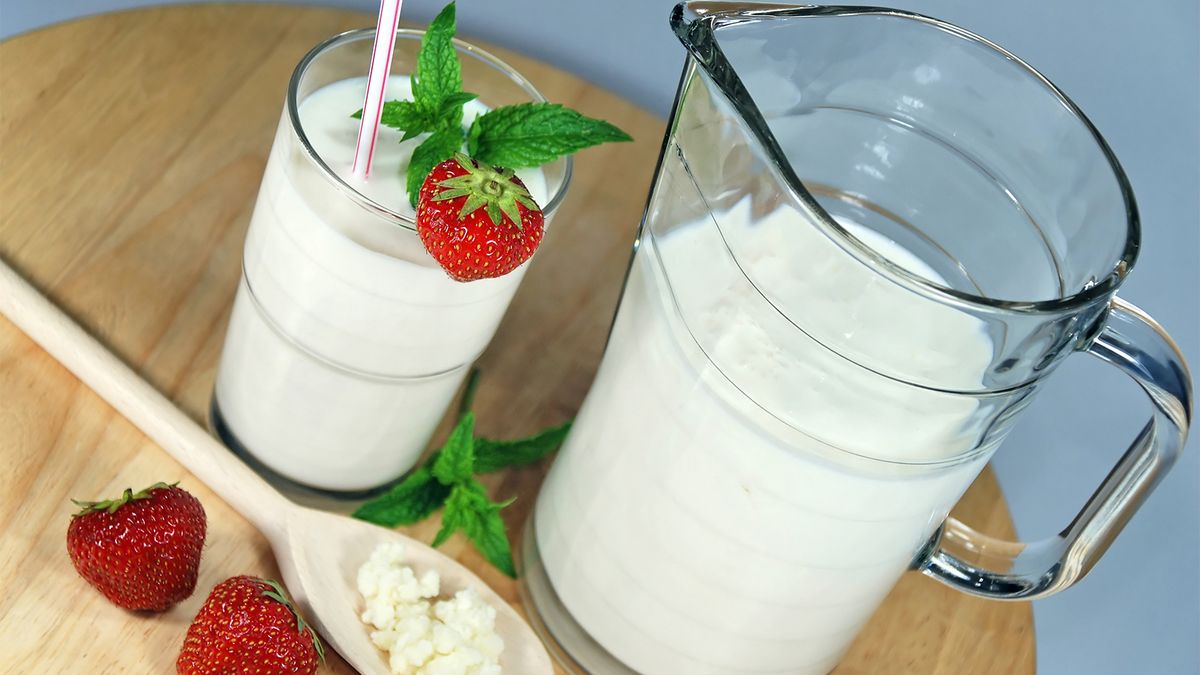
Kefir is definitely having its moment in the sun. This fermented milk drink that has actually been around for centuries is nutritionally rich and chock-full of good gut bacteria and other health benefits. But is it really as good for you as the hype?
Ancient Drink, Modern Appeal
Kefir is believed to have originated in the Caucasus Mountains, a region at the border of Europe and Asia. “Today, the largest kefir producers in the world are Russia and Poland, as well as Sweden, Norway, Finland and Germany,” says dietitian and nutrition expert Paulina Nowak in an email interview. “Interest is still growing in the United States and Japan.”
Kefir, from its beginnings until now, is most often produced from cow, goat or sheep milk. “However, it can also be produced on the basis of plant-based beverages, such as coconut, soya or rice milk, using fruit juices and water,” she says.
When made from animal milk, kefir has the consistency of drinkable yogurt with mild carbonation. Which makes sense, considering that while yogurt is the result of fermented milk bacteria, kefir is made from a combination of yeast and the product of bacteria fermentation known as “kefir grains.” Don’t get these confused with actual grain like wheat or rice, however. Kefir grains are a concentrated starter for making this “live” drink known for its medicinal properties.
“Kefir contains the probiotic strains lactobacillus acidophilus, bifidobacterium bifidum, lactobacillus kefiranofaciens, lactobacillus helveticus and more,” says Loren Richter, CEO and founder of nutritional supplement manufacturer BlueBiology, in an email interview. “Each probiotic strain provides the body with its own benefits.”
These probiotics are thought of as “good bacteria” similar to those that are naturally found in the digestive tract. “This means that kefir is good for gut health because it supports and helps to increase healthy bacteria and prevent harmful bacteria from growing,” says Melissa Hooper, dietitian and founder of the nutritional therapy company Bite-Size Nutrition, in an email exchange.
Kefir may be especially helpful for people with long-term antibiotic use since it will help rebuild the good bacteria that may be reduced by the antibiotics, and it may aid those with digestive issues such as irritable bowel syndrome, ulcers and even temporary cases of diarrhea.
And, because most of the lactose is removed during kefir’s fermentation process, the drink often can be tolerated by people who otherwise have trouble digesting milk products. “Although it can be made from milk, it’s low in lactose, but is high in probiotics, such as lactobacillus,” said Hooper. “In fact, kefir is considered to be more potent in probiotic strength than yogurt.”
Kefir also is a good source of nutrients. An 8-ounce (29-milliliter) cup of plain, low-fat kefir has 11 grams of protein and is just 110 calories. It’s also high in calcium, phosphorus, vitamin B12, riboflavin, magnesium and vitamin D.
Side Effects, Good and Bad
While kefir has the benefit of promoting bowel regularity — seen as a benefit both at home and while traveling — it can cause bloating, gas, nausea, cramping and even constipation, especially when first consumed. And, for some people, the tangy taste can be a problem.
“There aren’t many negatives, unless you just don’t like the taste,” says Keith-Thomas Ayoob, Ed.D., a fellow of the Academy of Nutrition and Dietetics, registered dietitian and associate professor emeritus in the pediatrics department of Albert Einstein College of Medicine in New York, by email.
Ayoob encourages label-reading of store-bought kefir products, as many can be high in added sugars, and says that it is a drink that is safe for all ages, except for those who are allergic to dairy.
Research is uncovering some surprising potential benefits to drinking kefir. One study from 2015 in the Iranian Journal of Public Health found that consuming kefir lowered fasting blood sugar levels for people with diabetes and resulted in decreased blood sugar over time. And a 2017 study in the Journal of Clinical Lipidology on the effects of kefir on cholesterol revealed significant decreases in “bad cholesterol” for those who drank the fermented milk. Researchers believe the probiotics in kefir may affect how the body absorbs cholesterol from food.
If kefir isn’t yet part of your hydration habit, adding it just may give your body an edge.

READ MORE
Researchers use new new cobalt-modified nano material to make fuel cells more robust, sustainable
Graphical abstract. Credit: The Journal of Physical Chemistry C (2023). DOI: 10.1021/acs.jpcc.3c04274 There is an [...]
Rice Can Help Save Salmon If Farms Are Allowed to Flood
Workers with the Nigiri Project head out to test pens in the flooded rice fields [...]
What It Was Like to Become the First Woman to Pilot and Command a Space Shuttle
Eileen Collins in space in 1995, when she became the first woman to pilot a [...]
New aging test could be gold standard for whisky producers
Graphical abstract. Credit: ACS Applied Nano Materials (2022). DOI: 10.1021/acsanm.2c03406 Researchers at a Scottish university [...]
Hilarious story of how the word ‘OK’ came into existence and became one of the most used words ever
The word “OK” has been a common phrase in our vocabulary and history suggests that [...]
How to Polish Aluminum Valve Covers
In recent years aluminum has replaced steel in the manufacture of cars. This is because [...]
Half of These Earwigs Use Their Right Penis. The Other Half Use Their Left Penis. Why?
A male (left) and female (right) Nala lividipes earwig Masaru Nishikawa The insects known as [...]
Is It a Fox on Stilts? Nope, It’s a Maned Wolf!
The maned wolf (Chrysocyon brachyurus) look a bit like the iconic red fox, with much [...]